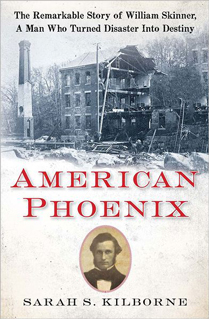“What’s finer than silk?” Joseph Allen Skinner asked at a family reunion in 1922. He then answered, “It is Character. For it is our character which lives. It is our character which influences others. It is our character which gives us our place in society…”
As I write this first blog post, I cannot get Joe Skinner’s question and answer out of my head. The Skinners made their fortune in silk; it brought the family out of poverty and into national renown. But what Joe Skinner is saying here, is that none of this would have been possible without character. He lived in a very different time, as did his father, William Skinner, the subject of AMERICAN PHOENIX, in which character was really put at a premium. In the 19th century, a person’s credit rating, for example, had nothing to do with his or her financial history. Rather, it was based upon character. Individuals and the companies they ran were given a high or low credit rating depending on whether they were considered to be trustworthy, ethical and just. Character was deemed essential to economic growth and something to be admired in both the marketplace and society.
Of course, scandals still occurred even with character at a premium but there existed a real depth of appreciation and reward for a person’s essential goodness. Skinner was a notorious risk-taker. Yet after losing everything in the Mill River Flood creditors still valued him as a sound investment because he was considered by his peers within his community to be “an honest, upright, straightforward man” who was “of good character and habits.” He wasn’t perfect. Far from it. But he had earned people’s trust based on who he was. This is something I think about today.
“What’s finer than silk?” Joe Skinner asked. Character. If you have character, you have heart. And if you have heart, you automatically make a difference in the world around you. That’s not just goodness within, but goodness all around

Speak Your Mind